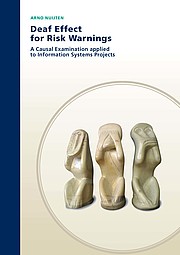Deaf Effect for Risk Warnings – A causal examination applied to Information Systems Projects Defended on Wednesday, 29 August 2012
Escalation of commitment to a chosen course of action is a phenomenon that shows for example when failing strategic Information Systems (IS) projects are continued for much too long. With this study we contribute to the explanation of why managers (Project Owners) respond with the Deaf Effect to Risk Warnings, even when these warnings are provided by a credible messenger, such as an internal auditor.
We examine whether the IS Project Owner’s Perceived Control is of influence on the Deaf Effect. We also examine whether the Deaf Effect for the risk warning is affected by the relationship with the messenger: is the messenger seen as a collaborative partner who is of help or is the messenger seen as an opponent who is exposing the Project Owner’s failures. Furthermore, we assess whether the Deaf Effect is affected by the presentation (framing) of the message in terms of Gains or in terms of Losses. Based on experiments we analyze the main effects and the interaction effects of those three factors to the Deaf Effect. In a multi-case study we explore other factors that can affect the Deaf Effect and could be interesting for further study. We discuss the contribution of our study to literature on escalating IS projects and to literature on internal auditing. Finally we discuss the implications of our study to the practice of IS Projects and Internal Auditing and to management practice in general.
Keywords
deaf effect, escalating commitment, projects, information systems, perceived control, framing, internal audit, partnership, stewardship theory, prospect theory, illusion of control theory








